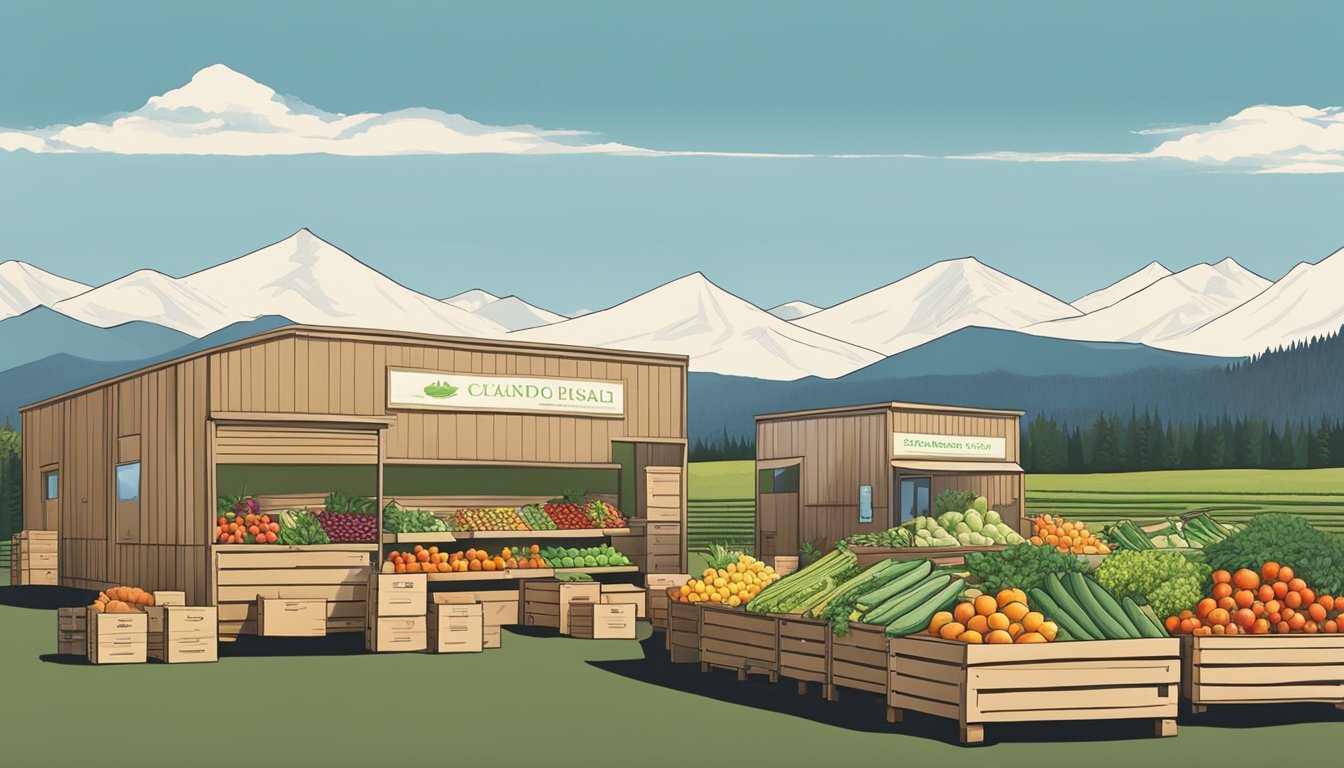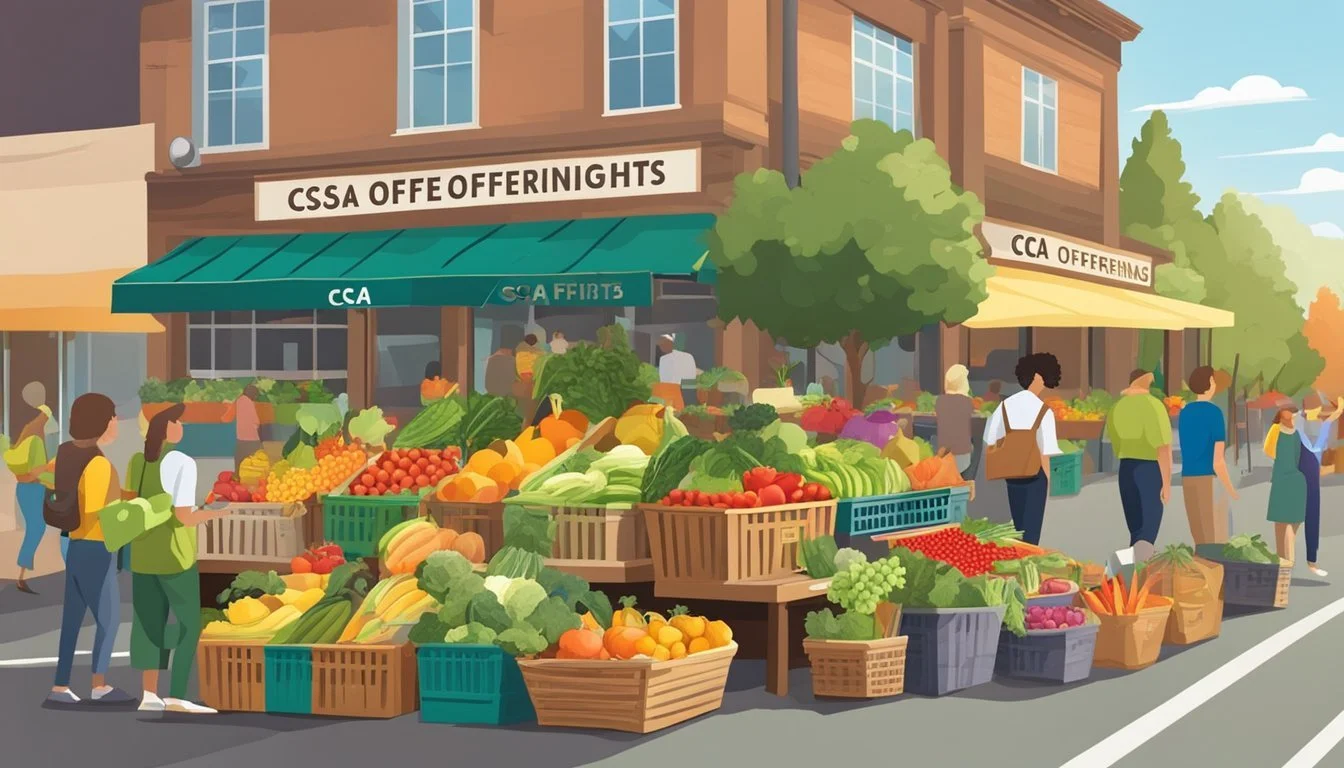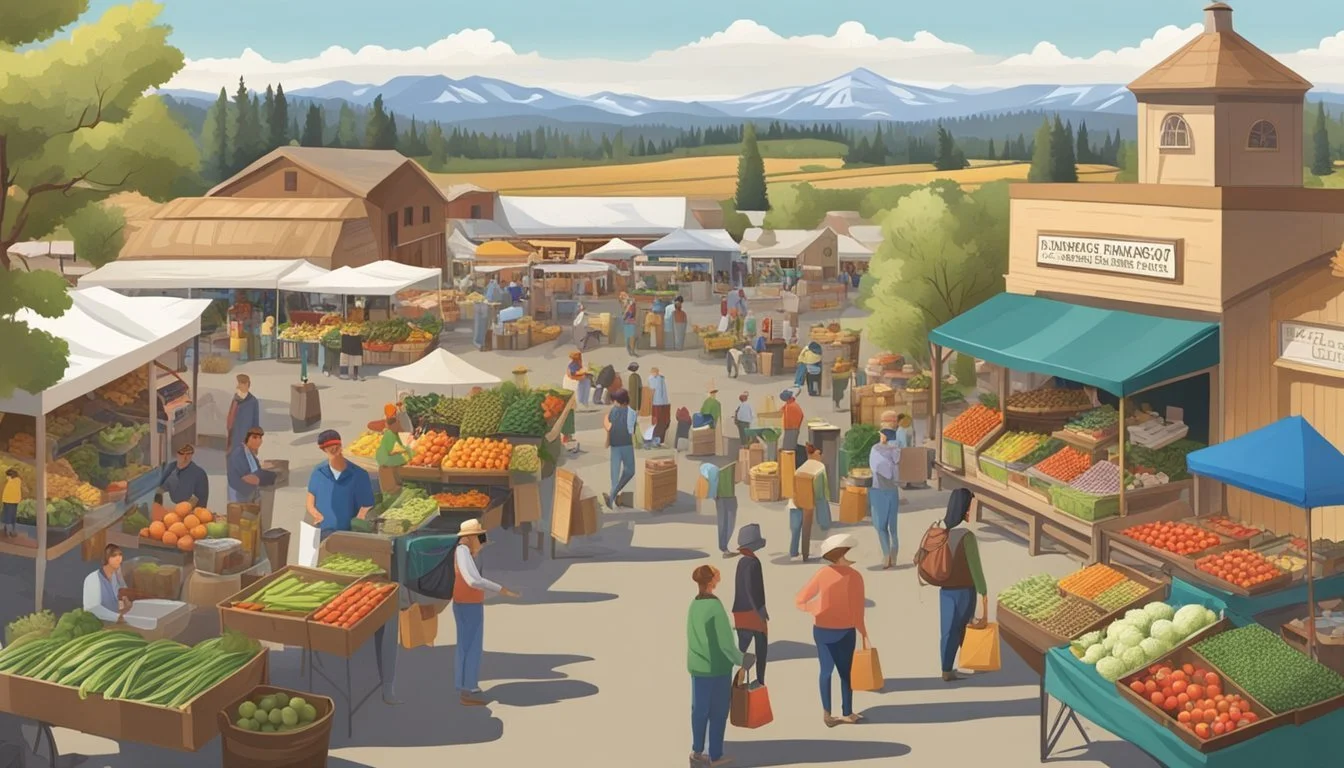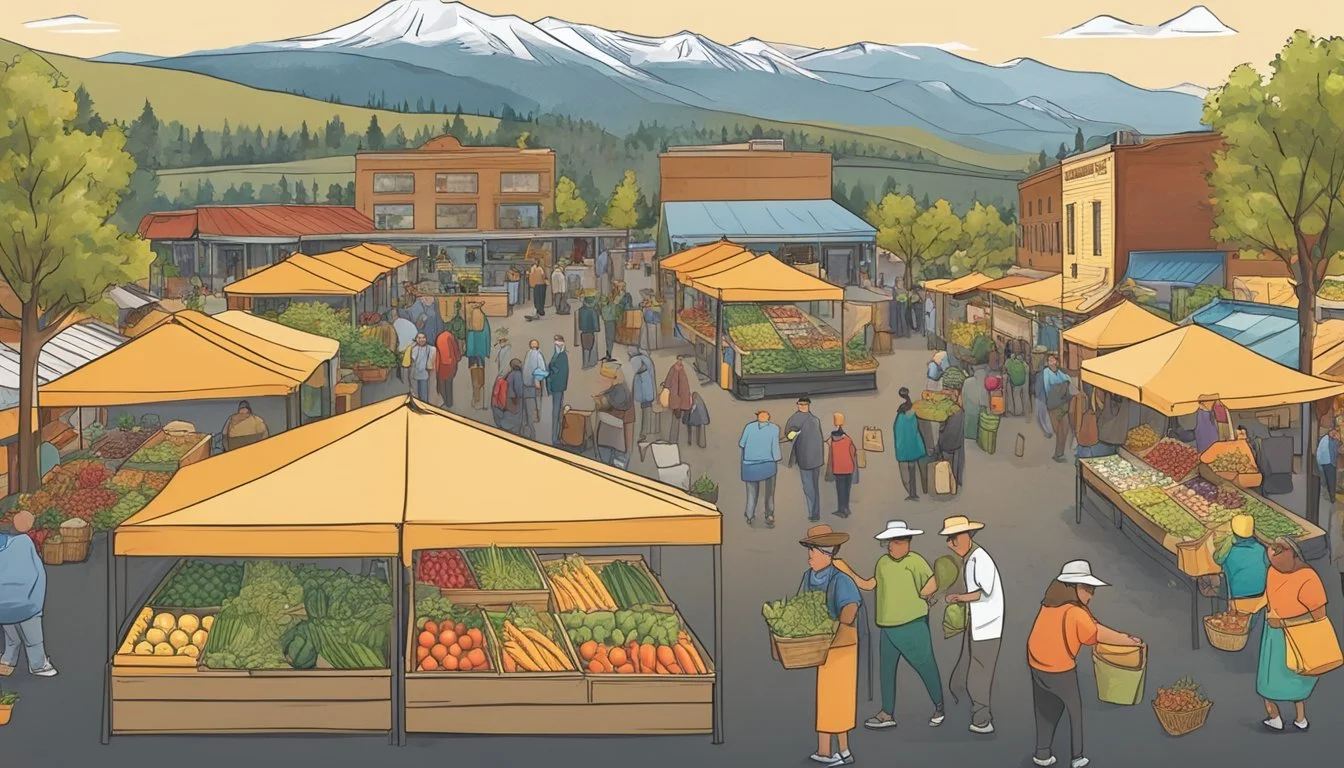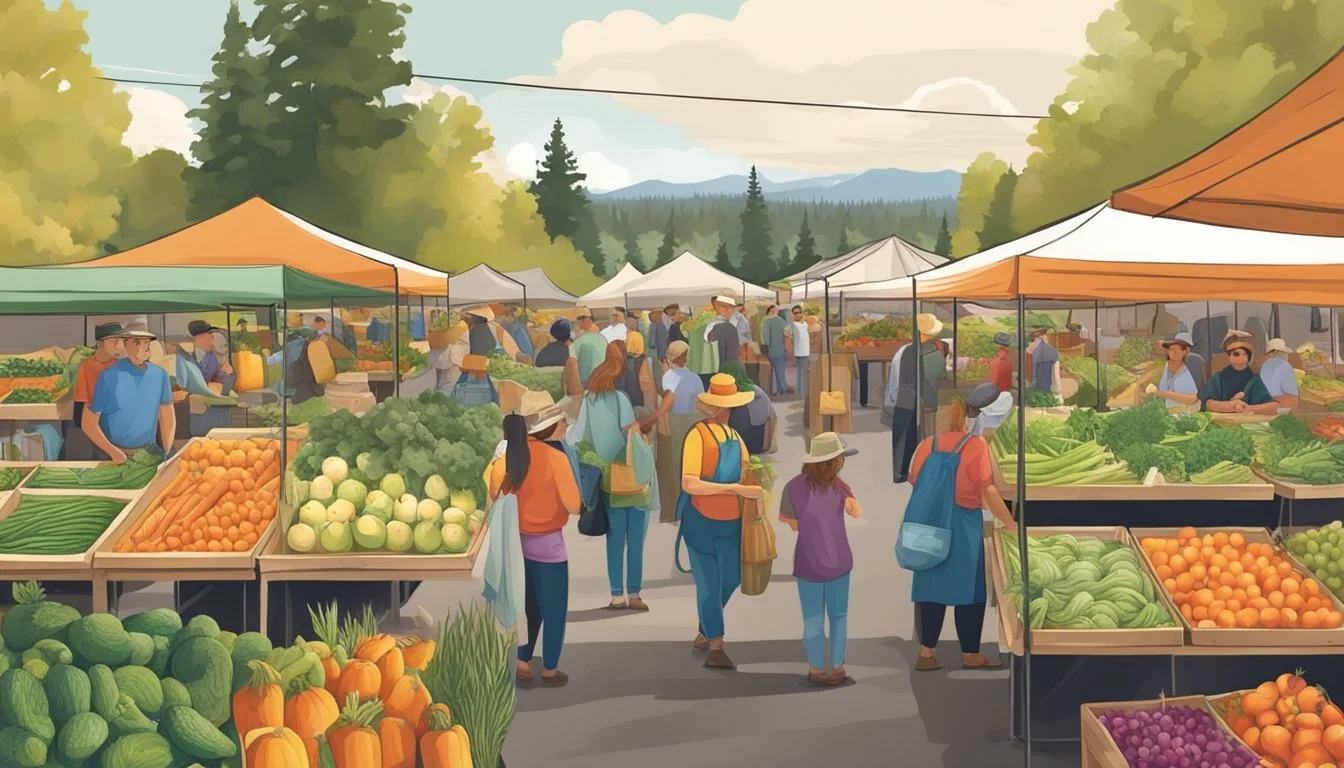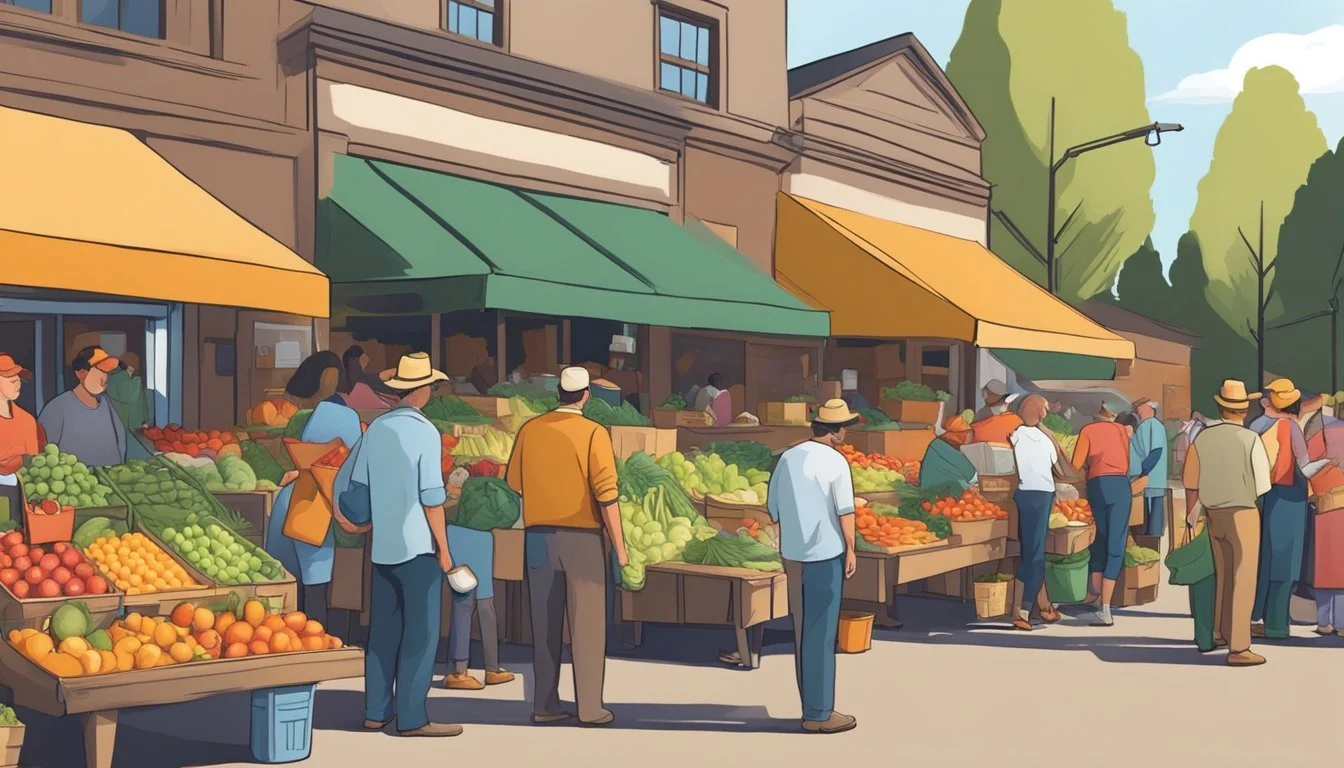Community Supported Agriculture in Bend, OR
A Guide to Local CSA Programs
Community Supported Agriculture, commonly known as CSA, has taken a firm root in Bend, Oregon, reflecting the town's commitment to sustainable eating and support for local farmers. In Central Oregon, CSA programs enable residents to purchase a share of a farm's harvest, providing them with regular distributions of fresh, locally grown produce throughout the farming season. This model promotes a direct partnership between local producers and consumers, where the risks and rewards of farming are shared and understood by both parties.
CSA members in Bend enjoy a bounty of organic vegetables that typically commence in May and last until the end of October. This initiative not only delivers farm-fresh goodness to the doorsteps of its members but also nurtures community relationships through a mutual investment in local agriculture. Consumers gain access to nutritious, seasonal food while participating in a system that values environmental stewardship and the cultivation of pesticide-free, naturally grown crops.
Farms like Fields Farm have anchored themselves within the CSA movement in Bend, offering shares that residents can subscribe to, guaranteeing them a portion of the harvest throughout the growing season. In addition to CSA subscriptions, local farms often sell their produce at farmers' markets like the NWX and directly from the farm, thereby increasing the avenues through which Central Oregonians can access fresh, locally-sourced food. Supporting CSA programs in Bend represents a commitment to sustainability, community engagement, and the continued prosperity of the region's agricultural heritage.
Understanding CSA
Community Supported Agriculture, or CSA, involves members subscribing to the harvest of a farm, thus sharing the risks and rewards of farming.
Origins and Principles
CSA has its roots in the early cooperative movements in Europe and Japan, and it functions on the principles of community involvement and shared risk. In its essence, CSA allows consumers to commit to a farm for a season by purchasing a membership. This subscription model ensures that the farmer has a guaranteed market, while members enjoy fresh, local produce throughout the growing season. Importantly, if environmental factors affect production, members may receive less produce, highlighting the shared risk involved.
CSA Models
There are various CSA models that have emerged over the years. The traditional model typically involves:
A weekly share of produce throughout the farming season.
Members paying in advance for a season’s worth of produce.
Some CSAs have adapted to offer more flexibility with:
Customizable share options.
Payment plans to ease the upfront financial burden for members.
Each model promotes local agriculture and a closer farmer-consumer connection.
Benefits of Participating in CSA
Community Supported Agriculture in Bend, Oregon, offers tangible benefits for both consumers and farmers. It fosters a robust local food system, enhances sustainable practices, and bolsters food security.
Advantages for Consumers
Consumers involved in CSA programs enjoy direct access to fresh, locally-sourced produce, which supports a healthy lifestyle. Purchasing a CSA share typically results in cost savings because:
Cost Efficiency: Consumers frequently pay less for organic produce via a CSA than they would at a local grocery store.
Peak Freshness and Flavor: Produce from a CSA is renowned for its freshness, having often been picked within a day of delivery.
Advantages for Farmers
Farmers gain significant advantages through CSA models by establishing a predictable income stream and creating strong relationships with community members. Here’s how:
Financial Stability: Pre-season payments from CSA shares provide funds for seeds and equipment, contributing to the farmer's financial security.
Community Connection: Farmers benefit from a direct market for their goods, fostering closer ties with consumers and ensuring support for their sustainable practices.
Starting a CSA in Bend
When initiating a CSA in the city of Bend, understanding community interest and crafting a detailed business plan are fundamental steps. These actions are critical to ensure the sustainability and success of a CSA, which relies heavily on community engagement and solid management strategies.
Assessing Local Interest
Prior to establishing a CSA, farmers in Bend should assess the level of interest within the local community. This can involve:
Surveys and Questionnaires: Distributing materials to gauge the community's desire for farm products on a subscription basis.
Community Meetings: Hosting meetings to discuss and promote the benefits of a CSA, encompassing a relationship that supports organic and local farming.
By engaging with the local population, farmers can better understand the demand for organic and sustainable produce in the area.
Business Planning and Management
Developing a business plan for a CSA involves several key factors:
Land Acquisition: Securing arable land that is suitable for growing a variety of farm products.
Financial Planning: Establishing a budget that includes initial investments, expected revenues, and operational costs.
Share Structure: Deciding the types of shares to offer (e.g., small meat and veggie share) and their pricing.
Sustainable Practices: Integrating sustainable farming practices that align with Bend's environmental values.
Legalities and Insurance: Ensuring that the CSA complies with all regulatory requirements and has appropriate insurance coverage.
With careful planning and effective management, a CSA can flourish in Bend by building a direct, supportive relationship between the community and farmers.
CSA Membership Details
Community Supported Agriculture (CSA) in Bend offers residents the opportunity to purchase a share of a local farm's harvest. Members receive weekly deliveries of fresh produce throughout the growing season, fostering a direct connection with their food source.
Membership Types
Membership typically comes in the form of shares that are designed to meet different household sizes and needs. Shares might include:
Individual/Couple Share: Suitable for 1-2 people.
Family Share: Designed for families and includes a greater quantity of produce.
Some farms also offer specialized shares like Fruit Only or Meat & Dairy Add-ons, providing additional variety and options to members.
Cost and Payment Plans
The fee for a CSA membership varies depending on the farm and the size of the share purchased. A general range is as follows:
Individual/Couple Share: $200-$300 for the season
Family Share: $400-$600 for the season
Payment plans are often available to make CSA memberships more accessible. Typically, one might find:
Full Payment Upfront: A single payment before the season begins.
Installment Plan: Divided into monthly or quarterly payments.
Some CSAs may offer a sliding scale fee or subsidized shares for low-income households. Members should inquire with the individual farms for specific payment options and any discounts that may apply.
Typical CSA Offerings
In Bend, Oregon, Community Supported Agriculture (CSA) programs provide residents with a variety of fresh and locally-produced food items. These offerings are typically organic and seasonally available. They ensure a direct and supportive relationship between consumers and farmers.
Seasonal Produce
CSA members in Bend can expect a diverse assortment of vegetables throughout the May to October growing season. These vegetables are grown without synthetic pesticides and fertilizers, aligning with organic farming practices. The selection varies with the season, including everything from root vegetables to leafy greens and summer squashes.
Meat and Poultry
Local farms often extend their CSA program to include options for meat and poultry. Chickens are raised for both eggs and meat, providing members with a source of protein that is pasture-raised and fed a diet without antibiotics or hormones. Some CSAs may also offer a range of other meats, such as beef and pork, from animals raised on the farm.
Additional Farm Products
Beyond the primary offerings of produce and proteins, subscribers to a CSA in Bend might also receive additional products. These can include fresh eggs from pasture-raised hens, enhancing the value and variety of the weekly or bi-weekly food boxes. Occasionally, CSA shares might also incorporate flowers, adding aesthetic value to the practical food offerings.
By subscribing to a CSA in Bend, community members directly support their local farmers and enjoy fresh farm products that are grown responsibly and sustainably.
Logistics of CSA Operations
Community Supported Agriculture operations in Bend have specific logistics that ensure the consistent delivery of farm products to members. This includes managing farm size to match production with demand, arranging distribution efficiently, and planning crops according to the seasons.
Farm Location and Size
In Bend, farms engaged in CSA typically range in size depending on the products they offer and the number of members they serve. Land management is crucial as it supports not only the diversity of seasonal food but also the quantity needed to fulfill shares throughout the harvest season. CSA farms must carefully consider their land's size and capability to sustain a variety of crops and possibly livestock while meeting their members’ expectations for fresh, local produce.
Distribution and Delivery Methods
Delivery methods for CSA shares in Bend vary, with some CSAs using centralized pick-up locations while others offer home delivery to subscribers’ doorsteps. The key is efficiency; shorter delivery routes save on costs and reduce emissions, aligning with the values of sustainability often associated with CSA. For the subscriber, the methods must uphold the freshness of produce, signifying a direct farm-to-table approach that characterizes CSA models.
Seasonality and Crop Planning
Successful CSA operations in Bend rely on meticulous seasonal food planning. Farms determine what and how much to plant based on historical weather patterns, member preferences, and their own capacity. Crop planning is integral to CSA logistics, as it shapes the harvest season, influencing what is available for distribution in farm shares. Farmers must balance a variety of crops to ensure a full season of produce, sometimes extending offerings by using greenhouses or cold frames to modify the growing environment.
Community and CSA
Community Supported Agriculture in Bend, OR, not only connects consumers directly with farmers but also fosters a deep sense of community through shared risks and rewards in agriculture and regular engagement events.
Building a Farmer-Consumer Relationship
In Bend, Oregon, CSAs serve as a vital link between local farmers and the consumers. Members of the CSA typically subscribe to receive a share of the harvest throughout the season, which emphasizes the symbiotic relationship between the two groups. The farmers get a predictable income and market for their products, while consumers enjoy fresh, locally-grown produce. For instance, Fields Farm operates a CSA program that brings organic vegetables to its members and contributes to a resilient local food system.
Community Events and Engagement
Community events play a crucial role in strengthening the bond between residents of Bend and their agricultural producers. These events offer opportunities for members to engage with each other and with the people behind their food. Farm-to-table dinners, farm visits, and local farmers' markets are common platforms for such engagements. CSAs like Cultivate Farms actively participate in local farmers markets and encourage community interaction, which in turn supports sustainable farming practices and reinforces agricultural connections within the Bend area.
Challenges and Solutions for CSAs
Community Supported Agriculture (CSA) farms in Bend face the dual issues of managing produce surplus/shortages and navigating market competition/customer retention. Strategic solutions are vital for the sustainability and success of these CSAs.
Dealing with Surplus and Shortages
Offering preserved goods: CSAs can convert excess produce into canned, dried, or fermented goods to be distributed during leaner times.
Donations to local food pantries can provide tax benefits and enhance community engagement.
Shortage Mitigation:
Data-driven planning: Utilizing historical data on harvest yields can help predict and mitigate shortages.
Partnering with other local food sources: Ensuring a steady supply of produce by collaborating with local farmers markets and food directories.
Market Competition and Customer Retention
Market Competition:
Enabling CSA farms to identify their unique selling points is crucial. They need to highlight these in local food directories and at the farmers market.
Market manager input can also guide strategic positioning, such as focusing on unique or high-demand crops.
Customer Retention:
Providing a memorable customer experience through farm visits or events encourages loyalty.
Clear and regular communication about the farming process and benefits of CSA membership can also foster a strong customer relationship.
CSA farms in Bend are continuing to evolve, finding innovative ways to balance supply with demand and secure their place in a competitive market.
Resources and Networking
Community Supported Agriculture (CSA) in Bend, Oregon, thrives due to strong networks and educational resources that support local growers and the wider community. These networks facilitate the direct relationship between farmers and consumers, while educational support empowers both parties with organic farming knowledge and application information.
Local and National CSA Networks
In Bend, CSA networks play a critical role in connecting local farmers with community members. They allow farmers to share resources, collaborate on best practices, and provide consumers with access to fresh, locally-grown produce. The Cultivate Farms network, for example, is a key player in the region, offering a range of Certified Naturally Grown produce. CSAs in Bend often participate in local farmers' markets, including the NWX Farmers Markets, to reach a larger audience.
Nationally, organizations such as the Community Supported Agriculture Association work to promote and advocate for CSA interests across the United States. Through these associations, growers can access a wealth of information and resources to enhance their farming strategies and market their shares effectively.
Network Type Examples in Bend, OR Contact Information Local CSA Network Cultivate Farms Link to Cultivate Farms Farmers’ Market NWX Farmers Markets Not Available National CSA Association Community Supported Agriculture Association Link to Association
Educational Resources and Support
Growers and consumers in Bend benefit from a variety of educational resources that provide support in organic farming methods and CSA operations. Fields Farm in Bend exemplifies a local farm that educates the community on sustainable agricultural practices. The farm operates a CSA program, emphasizing pesticide-free and soil-building techniques rooted in education.
Further educational support comes from materials and workshops that cover the full spectrum of CSA farming, from starting a CSA to managing day-to-day operations. These resources ensure continuous learning and improvement for both new and established CSA farmers, reinforcing the stability and growth of local food systems.
Sustainable Farming Educational Resource: Fields Farm
Key Focus: Pesticide-free farming, soil health
CSAs in Bend demonstrate the efficacy of combining robust local and national networks with solid educational foundations in sustainable agriculture. These elements, working in concert, assure the health of both the land and the local food community.
Regulations and Certifications
The integrity of Community Supported Agriculture (CSA) in Bend, OR is maintained through stringent organic certifications and adherence to local regulations. These assurances help consumers trust the quality and source of their produce.
Organic Certification
CSA farms in Bend, OR, like Cultivate Farms, are often certified as Certified Naturally Grown or adhere to similar standards as USDA Organic certification. This entails:
Compliance with Organic Standards: Farms must follow strict guidelines regarding soil quality, animal raising practices, pest and weed control, and use of additives.
Regular Inspections: Certification involves routine inspections to verify that farms are adhering to organic protocols.
Producers like Fields Farm assure that their vegetables are organic, providing fresh produce from May through October.
Local Regulations
Local regulations for CSAs in Bend, Oregon encompass:
Direct Sales: Farms typically engage in direct sales through farmer’s markets or on-site at the farm, as indicated by Fields Farm’s participation in local markets.
Member Agreements: CSA members often enter into agreements for a share of the farm’s output, involving a set amount of produce with some farms also offering dairy, meat, or eggs.
Entities like the Pacific NW CSA Coalition work towards educating and connecting local CSA farmers to consumers, ensuring that local regulations are followed and advocating for access to healthy food for all community members.
Marketing Your CSA
Effective CSA marketing hinges on strategic online engagement and fostering collaborative efforts with local entities to reach potential customers.
Online Presence and Marketing
In Bend, Oregon, maintaining a strong online presence is critical for Community Supported Agriculture endeavors. Farmers and CSA operators can utilize platforms like LocalHarvest to list their CSA, highlighting the fresh, organic produce they offer from May through October. Creating a user-friendly website with a search function helps members easily navigate to sign-up pages and receive regular updates on seasonal produce availability. Additionally, social media presence, particularly during peak farmers markets seasons, can amplify CSA reach, showcasing the farm's practices and the seasonal variety of produce.
Strategies for Online Marketing:
Listing on credible CSA directories like LocalHarvest.
Regular updates with vibrant imagery on social platforms.
SEO-optimized content to enhance search visibility.
Partnerships with Local Businesses
Forging partnerships with local businesses can lead to mutually beneficial outcomes for CSAs in Bend. By collaborating with establishments such as the Locavore store, CSAs can tap into an existing customer base that has an affinity for local and organic products. Furthermore, engaging with business networks across Bend solidifies the CSA's standing in the community and can lead to more shares sold. Aligning with the ethos and audience of local businesses ensures that marketing efforts resonate more authentically with potential consumers.
Advantages of Local Partnerships:
Access to a broader, like-minded customer base.
Increased exposure through local business channels.
Strengthened community relationships.
Technology Integration in CSA
Community Supported Agriculture (CSA) leverages technology to streamline operations and enhance the connection between farms and their customers. These modern practices are pivotal to the efficiency and scalability of CSAs.
Software for CSA Management
CSA management software addresses the unique needs of CSAs by providing tools for subscription management, payment processing, and customer communication. These applications enable farms to effectively manage member information, track share availability, and handle financial transactions. For example, a CSA farm may use software to automate the creation of weekly availability lists, allowing members to place orders and customize their produce boxes with ease.
Key software features include:
Automated billing: Scheduled payments are processed without manual entry.
Member databases: Stores information for each CSA member.
Order management: Tracks and fulfills customer orders and preferences.
Utilizing APIs for Connectivity
APIs (Application Programming Interfaces) serve as the backbone for modern CSAs, enabling seamless data exchange across various platforms. They connect CSA management software to other tools such as e-commerce platforms for online sales, logistics software for delivery scheduling, and inventory systems for real-time stock management.
APIs facilitate:
Real-time data syncing: Immediate updates on inventory and deliveries.
Cross-platform communication: Sharing relevant information between different applications used by the CSA.
By integrating APIs, CSA farms not only enhance their internal processes but also improve customer experience by ensuring that members have up-to-date information on produce availability, delivery times, and more.
Understanding Local Consumer Behavior
Community Supported Agriculture in Bend, Oregon reflects a diverse community engagement with investment in local farms and produce. The consumer base actively participates in a cycle that benefits both the growers and themselves.
Demographics and Market Analysis
Consumers in Bend, OR encompass a wide demographic range, including young professionals, families, and retirees who favor fresh, locally-sourced food. Market analysis indicates that Bend residents are inclined towards supporting local agriculture, with a preference for knowing the origin of their food. Participation in CSAs in the area demonstrates a commitment to sustainability and local economy. Consumers typically join CSAs at the onset of the growing season, purchasing shares of a farm’s upcoming harvest.
Key Demographics:
Age: Broad range, inclusive of all adult age groups
Income: Varied, but sufficient discretionary income to invest in CSA shares
Interests: Health-conscious, environmentally aware, community-oriented
Preferences:
Fresh, organic produce
Knowledge of food sources
Community involvement and support
Adapting to Consumer Tastes
Local farms and CSAs must stay adaptable to consumer tastes, which can shift with trends in cuisine and dietary habits. Organic vegetables, artisanal dairy, and free-range meats are often in high demand. The success of a CSA relies on its ability to meet these preferences and provide a diverse array of fresh, in-season produce and other farm products. Direct feedback from community members allows farmers to gauge and react to consumer preferences effectively.
Adaptation Strategies:
Offering a variety of produce and farm products
Including options for dairy, meat, or eggs as part of shares
Seasonal adjustments to crop planning
Consumer behavior in Bend, OR, is indicative of a larger trend towards local sustainability and a desire for a personal connection with the sources of one's food. CSAs cater to this behavior by fostering direct relationships and adapting to the culinary trends and health orientations of the community.

